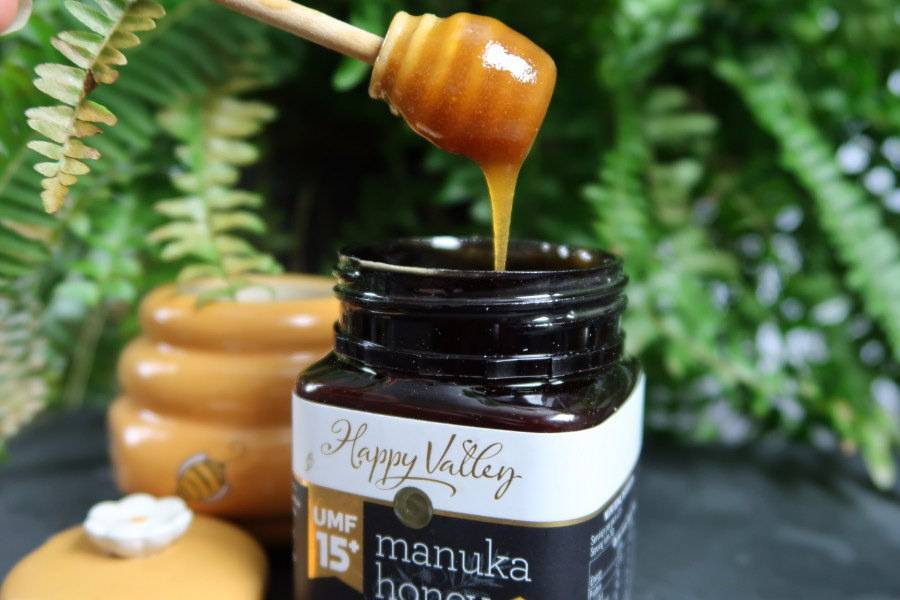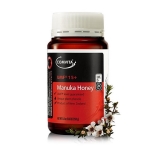Manuka honey is one of the latest crazes in the nutrition world. Made exclusively by European bees located in New Zealand and Southwest Australia, the nectar is sourced primarily from the delicate flowers of the manuka bush. The honey has a very unique “earthy” yet delicious taste due to the fact that the bees who make it rarely get nectar from other sources (most companies who sell it claim the honey to be more than 80 percent manuka).
While it’s not the cheapest honey you’ll ever buy, manuka is believed to be more than four times more potent from a health-boosting perspective than regular honey. It also contains three unique ingredients which work to boost the immune system, revitalize hair, along with other unique benefits. Keep reading to learn more about how manuka is made, its health benefits, and how to find the most potent manuka available.
How Manuka Honey is Made
There’s nothing complicated about how honey is made. Manuka honey is made when bees collect nector found on the manuka bush; a bushy flowering plant native and exclusive to New Zealand and select small areas in Southwest Australia. This plant thrives in New Zealand and luckily for those who love the honey and its benefits, manuka bushes aren’t harvested like many other flowering plants that bees make their delicious honey with.
Bees harvest nectar and pollen from the manuka flower, then return to their hive where they deposit honey and nectar into the honeycombs where larvae are born. The process by which all the bees in a hive make honey is quite involved, which is where the term “worker bee” likely originated.
Basically, collector bees suck nectar from the flower, which is then stored in a separate stomach called the “honey stomach.” After they become full, they fly back to the hive and pass the honey to worker bees who take turns chewing the nectar until it becomes honey.
The end result, where manuka is involved, is a very rich, earthy tasting honey that’s unlike anything else found in the world. The rich nectar, combined with highly nutritious pollen that’s deposited in the hive when it falls off the collector bees is what makes manuka so highly sought after.
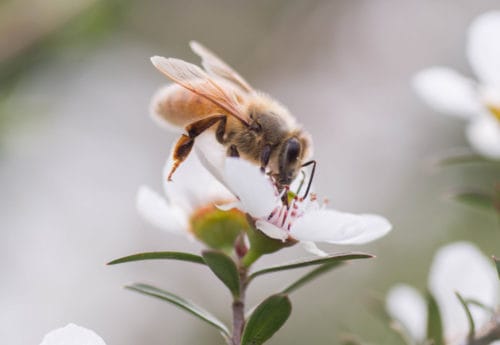
What Makes Manuka Honey Better?
First, manuka honey isn’t pasteurized, due to the arguable nutrition-robbing effects of pasteurizing food products. Though according to the USFDA and other health organizations, pasteurization has a negligible effect on vitamin and mineral levels in food — not enough studies have been performed on pasteurization as it relates to other beneficial compounds like antioxidants or the three major constituents in manuka honey described further down the page.
What has been confirmed is that pasteurization lowers calcium and phosphorous levels by 5 percent; thiamine and B12 levels by 10 percent; and vitamin C (not found in manuka) by 20 percent. It also destroys harmful pathogens and prolongs the shelf life of many foods.
Since quality manuka honey isn’t pasteurized or filtered, there’s no need to worry about any loss of nutrition. However, to preserve your health and avoid complications, always buy your manuka from reputable suppliers who test their products prior to bottling them.
Manuka honey has been proven to have up to four times the nutritional value, and many more times the healing benefits of regular honey. Particularly when compared to pasteurized commercial honey which is often regarded as nothing more than a natural sugar source. When bees snack on pollen from the nutrient-dense manuka bush, there is a much higher level of health-boosting ingredients that make it in to the end product:
• Essential and non-essential amino acids.
• B vitamins: thiamine, niacin, riboflavin, pantothenic acid, and B6
• Calcium
• Iron
• Magnesium
• Manganese
• Phosphorous
• Potassium
• Zinc
Three of the most interesting ingredients found in manuka honey are thought to have a huge impact on health when consumed regularly (these will be discussed further down the page):
1. DHA (dihydroxyacetone)
2. Leptosperin
3. MGO (methylglyoxal)
These three ingredients are what make up the UMF rating that’s found on jars of manuka honey. The higher the rating, the more medicinal the product is considered. As a consumer, you can expect to pay much more for higher UMF ratings. As an example, the price will double from a UMF 5+ to a UMF 10+, and can triple when upgrading to a manuka honey with a medical grade UMF 20+ rating.
The cost is much higher because manuka is only sourced in one small area of the planet, and is only able to be harvested in limited batches a few times a year. Consider this in contrast to many other areas of the world where honey can be harvested year-round, in massive batches. The manuka bush is rare, and, third party testing by the New Zealand UMF Honey Organization, Non GMO, Halal, and Kosher certifications all cost the manufacturers more money.
All this boils down to the utmost assurance to consumers that what they’re paying for is actually worth the cost. You’ll not find a more highly scrutinized product, tested to infinity for purity, anywhere in the natural health food industry.
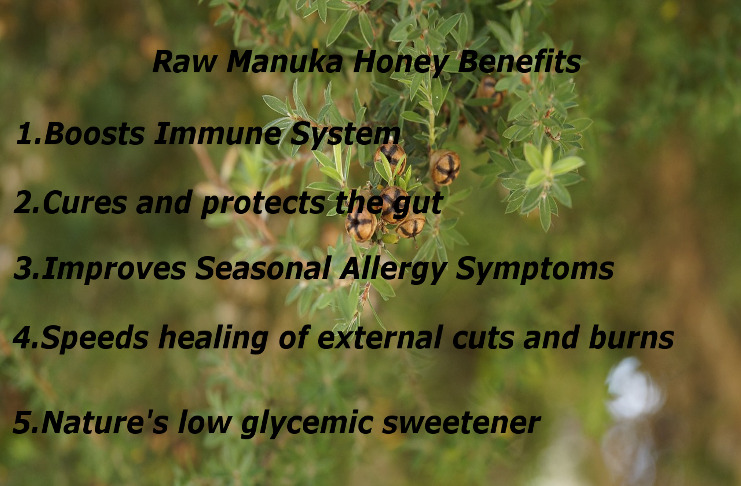
Raw Manuka Honey Benefits
*Keep in mind that Wikipedia and several other trusted sources place extreme doubts on the health claims made about manuka honey, but read the reviews on the taste difference between this and regular honey and the extra cost is still worth the gamble.
You can liken the difference between pasteurized grocery store honey to manuka as being the same as the difference between a cheap wine and a more expensive one: a ten-year-old Cabernet Sauvignon found in a specialty wine shop is much more desirable to discerning palettes than a cheap one-year-old Bordeaux from a convenience store.
1. Boosts Immune System
The reason we all reach for a jar of honey when we’re ill is a mystery no longer! A study by the Journal of Leukocyte Biology determined that manuka honey stimulates immune cells by blocking immune-suppressing TLR2 and TLR4 in the body. The study further hypothesized that this effect boosted immunity in participants and improved wound-healing time too. Manuka is often consumed to help prevent and cure colds, flu, sore throats, and sinus infections.
Other studies have shown manuka to be effective at preventing and curing sore throats caused by streptococcus bacteria, and the National Cancer Institute has manuka listed as an effective treatment for chemo-induced sore throats resulting from inflammation. More studies need to be funded in order to determine how far-reaching the immune benefits may be, including the prevention of certain cancers and heart disease.
2. Cures and protects the gut
Our gut bacteria is responsible for everything from helping to digest our food, to regulating immune system function, to telling our brain what kind of nutrients we’re missing in our diet. Manuka’s a bactericide, proven to kill a particularly nasty strain of harmful bacteria called C. difficile; an antibiotic-resistant bacteria.
C. difficile accounts for approximately half of all infections acquired in the hospital and proliferates in people with reduced immune function or who’ve taken too many antibiotics. This strain of bacteria can cause gut imbalances and a host of stomach, intestinal and bowel issues ranging from irritable bowel syndrome (IBS), diarrhea, colitis, and others.
3. Improves Seasonal Allergy Symptoms
Throughout the ages, people from all cultures have consumed honey for its positive effect on curbing seasonal allergies. Despite this long held knowledge, few studies have been performed on the superfood to see just how well it performs.
One study found that patients suffering from seasonal birch pollen allergies were able to cut their antihistamine medications in half when consuming high-grade honey (remember that manuka is considered the best). While the study did point out that honey with birch pollen (BPH) added produced slightly better results than regular honey (RH), the difference was marginal, and vastly superior to those who only consumed their prescription antihistamines.
4. Speeds healing of external cuts and burns
Considering the bactericidal properties of manuka honey, it should come as no surprise that when applied to external cuts and wounds, it speeds healing. Manuka can be applied directly as a salve, as part of a poultice, or diluted 1:1 in distilled water. In fact, the best manuka honey (UMF 15+) is considered the best for skin irritation.
Most evidence is from hoards of “old wife” types who’ve used it to successfully treat family wounds for years. Very few studies exist to prove this benefit. Patients recovering from eye surgery in one study claimed to have less pain when manuka was applied to their wounds (one eye with manuka, the other with vaseline), but researchers could see nothing visual to back manuka’s efficacy.
5. Nature’s low glycemic sweetener.
High glycemic foods contain sugars that break down much more quickly than sugars with lower glycemic values. Type I and II diabetics suffer from an inability — or impaired ability to process sugars effectively. This causes high blood sugar readings and leads to a host of health issues, including heart and kidney disease. Manuka is a lower glycemic treat, that can be used in place of sugar in a number of beverages and sweet treats.
Manuka honey has a moderate glycemic index (GI) value of 54 — 59, compared to the high values reported for equal amounts of white sugar (GI=68). This fact is based on a comparison between 25 grams of manuka mixed with water, versus 25 grams of standard white sugar diluted in water and their effect on post-prandial blood sugar levels. Knowing this, manuka is even much less of a glycemic load on the body than many fruits like watermelon (GI=72) and guava (GI=78).
Recommended Brands That Sell Raw Manuka Honey
1. Comvita Certified UMF 15+ (Super Premium) Manuka Honey
Comvita is a raw manuka honey brand that’s preferred by purists because they offer some of the highest UMF ratings of all brands, including the 20+ rating that’s considered medical grade. In fact, Comvita is considered the best in terms of pure New Zealand manuka, yet their premium pricing forces many to opt for lower quality brands.
Comvita follows all the rules needed to obtain and maintain their UMF designation. This UMF 15+ product is a great way to get a taste for raw manuka, while appreciating the medicinal benefits, while staying within budget (their 20+ is nearly triple the price, which can be daunting for a first purchase!)
2. Manuka Health Manuka Honey
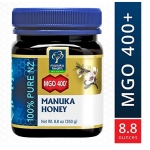
Manuka Health measures the methylglyoxal in their product, and this one is rated at and MGO 400+ for purity. Unfortunately, there is no accurate way to convert MGO ratings to UMF, but this product is a long-standing favorite in New Zealand and fast becoming popular elsewhere, too. Manuka Health’s honey is most popular among people looking for relief from various skin conditions like psoriasis, blisters, and boils.
If you’re looking for one of the best tasting brands of manuka available, you’ll not be disappointed with this version. The color is unique, too, with a very rich and thick dark brown shade to it. Manuka Health fans claim there isn’t a better tasting and more reliable choice (Ie., same taste from batch to batch). Best, after you’ve tried it and fallen in love, you can save a few dollars on your next purchase by upgrading to the one pound jar.
3. Wedderspoon Raw Premium Manuka Honey
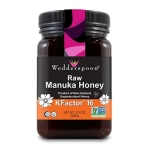
Wedderspoon Manuka UMF 16+ is one of the most popular brands of raw manuka honey on the planet. The UMF rating of 16+ ensures its superior quality, hailing out of the land of endless meadows and sunshine in New Zealand. Pure Manuka is branded as having up to four times the nutrient profile of regular honey and is the go-to for people looking to boost their immune system, improve gut health, and for treating H.Pylori bacteria infections in the body.
Wedderspoon guarantees that up to 75% of this liquid gold is made up of highly nutritious manuka pollen. The only drawback is that there is no official UMF label on the jar, meaning Wedderspoon completes tests on their own honey and doesn’t send it out for third-party testing and UMF certification. Wedderspoon doesn’t use UMF ratings because they have their own way of rating the health benefits of different batches of manuka called “K Factor” which you can learn more about here.
4. Kiva Certified UMF 15+ Raw Manuka Honey

Kiva Certified isn’t the most popular brand of New Zealand manuka honey, but it’s sure a hit with those who buy it regularly. This version is UMF 15+ and tastes very good. It’s not as earthy as Comvita or Manuka Health, but it’s also significantly less expensive than either of those brands. All Kiva Certified products are made in ISO 9001 facilities and their claim is that the MGO rating of this product is over 825.
The company also offers a medical grade manuka, and it’s around $40 cheaper than top-branded Comvita, which is likely what makes this honey such a hit on Amazon. Kiva Certified is a favorite among medical professionals who believe it to be a high-purity product with an easy to handle price tag.
5. Trader Joe’s Manuka Honey

Trader Joe’s is a fast emerging UMF-quality manuka, with a much reduced price point. It’s gaining popularity not just for its lower price, but incredible taste! Keep in mind that while the jar bares the 10+ mark, the company decided to stop obtaining the UMF certification a little while back in an effort to keep prices low for their customers.
This is a welcome relief for manuka lovers looking for the taste and quality the honey can offer, without the inflated price tag needed to keep the product in UMF compliance. I have yet to try this product, but reviews indicate that this offering tastes and smells just as earthy as manuka with UMF 15+ ratings.
Conclusion
Manuka honey is far superior to other kinds of honey. It’s non pasteurized, unfettered in any way, and harvested and bottled with a level of care not to be found in North American and European honeys. The unique taste alone is reason enough to make the switch. However, similar to how spending a few dollars more on bottle of wine or spirits will make it impossible to ever consume the bargain brands again, the same will happen to you when you try manuka for the first time.
The health benefits are another issue entirely, with its immune boosting benefits, you can kiss sore throats, colds, allergies, slow healing wounds goodbye. All while enjoying the natural sweetness of manuka in your favorite beverages and dishes, or eating right out of the jar with a spoon. Give manuka a try, I promise you’ll never look at regular honey the same way ever again!

